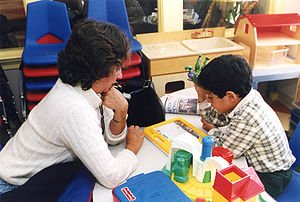
Bonnie Davis writes in How to Teach Students Who Don’t Look Like You,
In searching for the causes of the achievement gap, [Haycock] and her research colleagues ask adults why there is a gap. They hear comments from educators that the children are too poor, the parents don’t care, and they come to school hungry. The reasons, she adds, are always about the children and their families. Yet, when she talks to the students, she hears different reasons. Students talk about teachers who do not know their subject matter, counselors who underestimate their potential and misplace them, administrators who dismiss their concerns, and a curriculum and expectations that are so low level that students are bored.
I’m curious about the methods of this study. Were teachers simply asked to share their assumptions, with researchers later collating and categorizing them? Or was there a questionnaire? Either way, there is an element of interpretation necessitated by such research that might make it far from objective.
I’m particularly curious about the claim that students find the curriculum so low-level that they’re bored. I don’t doubt their claim to be bored, but I’m skeptical about the cause of that boredom.
In my own classroom experience, I’ve found the state-mandated curriculum to be too challenging for many of the students placed in on-level classes (students who, generally, actually read two to three grade levels lower than their actual grade). I often feel my expectations are too high.
But is this why children are bored in the classroom? Is there a societal element? I believe there is. Contemporary entertainment media — games, television, the Internet — have taught students to expect short, entertaining bites of information.
The question is obvious: are we competing with the new media?
We might be in competition for students’ attention, but to that I’m tempted to say, “Well, that’s at least equally the students’, parents’ and teachers’ fault.” I agree that teachers should be interesting and engaging, but the point of the classroom is not entertainment, and the defining criterion of an effective twenty-first century teacher should not be their ability to entertain students.
0 Comments